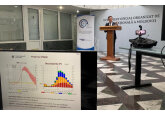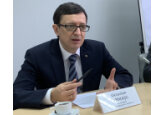
In 2022-2024 the need to finance Moldova's balance of payments will reach $1.7 billion.
This is stated in a letter that the leadership of the government and the National Bank of Moldova sent earlier to the International Monetary Fund with a request to increase the amount of financing under the current program with the IMF by $260.11 million - up to $795.72 million and approve the immediate allocation of a new tranche in the amount of $144.81 million. As noted, the effects of the war in Ukraine affect the Moldovan economy through a variety of channels, including a surge in energy prices, trade disruptions, an adverse impact on public confidence and the indirect impact of sanctions. As a result, external accounts and the budget deteriorated, reserves fell and funding requirements piled up. The letter states that the war in Ukraine and international sanctions against Russia and Belarus have led to a further deterioration of the economic and social environment in Moldova, which still remains quite difficult. Ever since the fall of 2021, high and volatile natural gas prices have complicated the political decision-making environment amid the ongoing COVID-19 pandemic. In addition, the war had a significant negative impact on the national economy, the total number of arriving Ukrainian refugees reached the level of about 15% of the population of our country. In this difficult context, the budgetary reserves that served as the first line of defense in meeting humanitarian and energy security have been almost exhausted. The pressure on the foreign exchange market came to the fore, which led to interventions on the market of the National Bank for the sale of foreign currency in the total volume of more than 10% of the volume of foreign currency reserves. The current account deficit continues to widen due to significant trade with Russia and Ukraine (about 22% and 12% of total imports and exports, respectively) and high commodity prices worldwide. Decreased confidence in the future negatively affects the liquidity of commercial banks and their willingness to invest in government securities, which negatively affects private consumption and investment. It is noted that the escalation of shocks generates significant financing needs and threatens social cohesion. The document says that the short-term economic outlook will be significantly affected due to the combined impact of the war in Ukraine, rising energy prices and the ongoing COVID-19 pandemic. “We expect economic stagnation in 2022 with a projected GDP growth of 0.3% compared to a pre-war forecast of 4.5%. Driven by rising food and energy prices, we forecast an average inflation of 22% in 2022, which presents the NBM with the challenge of finding the right balance between tightening monetary policy targets and supporting economic recovery. We expect the state budget deficit to reach 7.2% of GDP compared to 6% previously envisaged by the State Budget Law for 2022, the current account deficit to reach 13% of GDP, and the volume of foreign currency reserves to decrease to $3.3 billion, which is equivalent to covering 4.5 months of imports,” the letter says. It notes that downside risks to the outlook remain significant. A sharper-than-expected rise in energy prices or disruptions in energy supplies could hurt the balance sheets of companies in both the public and private sectors. Uncertainty about energy security associated with the need to conclude a new contract for the supply of electricity or limited progress in the audit of Moldovagaz's gas debt could lead to supply disruptions and significant budgetary costs. The escalation of the war in Ukraine could undermine confidence in the future, put pressure on the national currency, undermine the domestic market for government securities and culminate in a massive withdrawal of deposits from the banking system. “The first line of defense against these significant risks is the consistent implementation of reforms. Attracting additional resources from the IMF, other multilateral and bilateral partners and donors should help build confidence in overcoming negative shocks,” the letter says.// 17.05.2022 — InfoMarket







